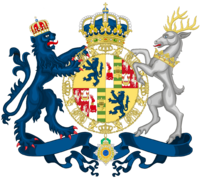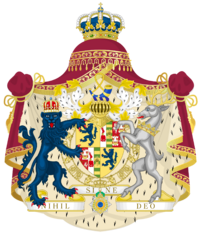Reichsrat (Mascylla)
This article is incomplete because it is pending further input from participants, or it is a work-in-progress by one author. Please comment on this article's talk page to share your input, comments and questions. Note: To contribute to this article, you may need to seek help from the author(s) of this page. |
Mascyllary Reichsrat Maskillischer Reichsrat | |
|---|---|
| 24th Reichsrat | |
 | |
| Type | |
| Type | |
| Leadership | |
Dorothy I since 25 November 2005 | |
Prime Speaker | |
Deputy Speaker | Dietmar Kranz-Straußing, ABP since 17 November 2018 |
| Structure | |
| Seats | 448 |
 | |
Political groups | Royal Government (256)
Royal Opposition (182)
|
| Elections | |
| Party-list mixed-member proportional representation (MMP) | |
Last election | 12 September 2020 |
Next election | October 2024 |
| Meeting place | |
 | |
| Reichstag building, Lorenz-Prinzwald, Königsreh, Mascylla | |
| Website | |
| www.maskillischer-reichsrat.ma | |
 |
|---|
| This article is part of a series on the politics and government of Mascylla |
The Reichsrat (Hesurian pronunciation: [ʁaɪ̯çsʁa:t], lit. ‘Diet of the Realm’) is the parliament and practiced lower house of the legislature of the Crowned Republic of Mascylla seated in Königsreh. The Reichsrat is defined within the political system of Mascylla as the only legislative institution by the Constitution directly elected by the people of the country, but is, in essence, sharing its constitutional duties with the Reichssenat, the de facto upper house of the parliament comprising delegates from Mascylla's federal states.
The legal amount of its members is set at 448, while the number can be changed accordingly with overhang and compensation seats. As of 2020, the size of the Reichsrat has been reduced to its original size, but the body itself reached its largest size in the 1980s, encompassing more than 601 seats which made it the largest elected national legislative body in the world at the time. A legislative period of the Reichsrat is about four years long, elected by universal suffrage and secret ballot under a system of party-list proportional representation. The Members of the Reichsrat (Mitglieder des Reichsrates; MdR) can form fractions (Fraktionen) and are thus subject to a special procedural and organizational status. The institution is often referred to as the Mascyllary House of Commoners (Maskillisches Bürgerhaus) by foreign legal scholars, in contrast to the Reichssenat.
The Reichsrat is represented by the Prime Speaker (Vorderster Sprecher des Reichsrates; shortly Reichsratssprächer), which also acts as a direct intermediate between the President of the Reichssenat and the Prime Minister of Mascylla; the current Prime Speaker is Walther Steintz of the SDP since 2016. The institution has had its seat in the Reichsrat building in central Königsreh since 1866. Additionally, it maintains a number of locations and buildings to support its parliamentary function.
The Reichsrat is responsible for a wide range of duties: it holds the power of legislation, meaning that it assesses federal and state law and passes laws of its own, often cooperating with the Reichssenat in national legal affairs. The body also accepts or rejects treaties with foreign parties such as sovereign states or international organizations, can ultimately declare martial law, emergency law, and war, and sets the federal budget of the country. It also approves candidates as judges of the High Court of the Realm proposed by the Prime Minister and ceremonially accepts the Prime Minister-elect as incumbent office holder, having been formally appointed by the incumbent Monarch, as part of its Kreationsfunktion status. The Reichsrat exercises parliamentary control over the government as executive power and can force individual members of the government or the government itself to resign by means of a vote of no-confidence. Moreover, it is significantly tasked with the Öffentlichkeitsfunktion, meaning that is legally obligated to represent the populous in its entirety and inform it on any noteworthy development or matter of importance.
Seat and plenary hall
Duties and tasks
Mandates
Legislation
Organization
Election
Control of the executive
Historical development

RU/ABP, SDP, MLP, NDU, People's Party, The Greens, Left Union
Other historical parties present between 1924 and 1976:
Communist Party, MNVP, Other parties
